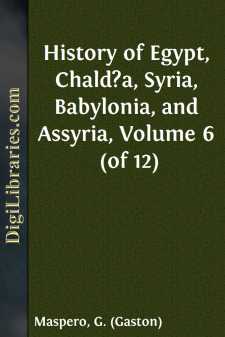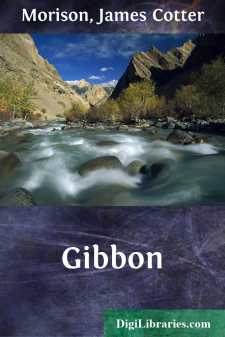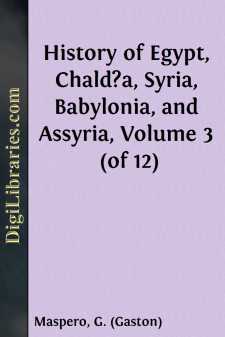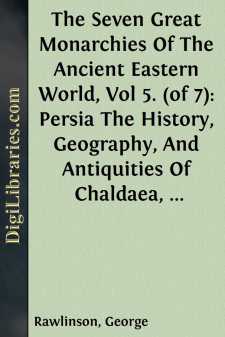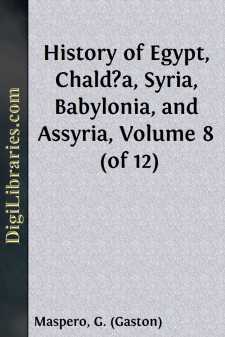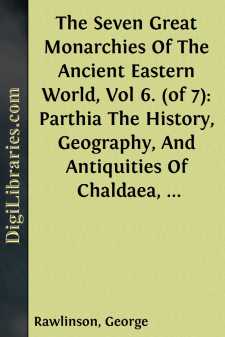History
- Africa 30
- Americas (North Central South West Indies) 50
- Ancient
- Asia 58
- Australia & New Zealand 8
- Canada 41
- Caribbean & West Indies 1
- Civilization 20
- Eastern Europe 12
- Europe 310
- Expeditions & Discoveries 60
- General 77
- Historical Geography 1
- Jewish 9
- Latin America 3
- Medieval 8
- Middle East 13
- Military 248
- Revolutionary 8
- Study & Teaching 5
- United States 353
- Western Europe 56
- World 13
Ancient Books
Sort by:
CHAPTER I—THE CLOSE OF THE THEBAN EMPIRE—(continued) Ramses III.: Manners and Customs—Population—The predominance of Amon and his high priests. Opposite the Thebes of the living, Khafîtnîbûs, the Thebes of the dead, had gone on increasing in a remarkably rapid manner. It continued to extend in the south-western direction from the heroic period of the XVIIIth dynasty onwards, and all the...
more...
CHAPTER I. GIBBON'S EARLY LIFE UP TO THE TIME OF HIS LEAVING OXFORD. Edward Gibbon was born at Putney, near London, on 27th April in the year 1737. After the reformation of the calendar his birthday became the 8th of May. He was the eldest of a family of seven children; but his five brothers and only sister all died in early infancy, and he could remember in after life his sister alone, whom he...
more...
CHAPTER I—ANCIENT CHALDÆA The Creation, the Deluge, the history of the gods—The country, its cities its inhabitants, its early dynasties. "In the time when nothing which was called heaven existed above, and when nothing below had as yet received the name of earth,* Apsu, the Ocean, who first was their father, and Chaos-Tiâmat, who gave birth to them all, mingled their waters in one, reeds...
more...
by:
John Wilson Ross
CHAPTER I. TACITUS COULD BARELY HAVE WRITTEN THE ANNALS. I. From the chronological point of view.—II. The silence preserved about that work by all writers till the fifteenth century.—III. The age of the MSS. containing the Annals. I. The Annals and the History of Tacitus are like two houses in ruins: dismantled of their original proportions they perpetuate the splendour of Roman historiography, as...
more...
by:
George Rawlinson
CHAPTER I. EXTENT OF THE EMPIRE. The geographical extent of the Fifth Monarchy was far greater than that of any one of the four which had preceded it. While Persia Proper is a comparatively narrow and poor tract, extending in its greatest length only some seven or eight degrees (less than 500 miles), the dominions of the Persian kings covered a space fifty-six degrees long, and in places more than...
more...
by:
Cassius Dio
BOOK 36, BOISSEVAIN.) The beginning of this book is missing in the MSS. The gist of the lost portion may in all probability be gathered from the following sentences of Xiphilinus (p. 3, R. Steph.): "When the consuls drew lots, Hortensius obtained the war against the Cretans. Because of his fondness, however, for residence in the capital, and because of the courts (in which his influence was only...
more...
by:
Julius Caesar
BOOK I I.—All Gaul is divided into three parts, one of which the Belgae inhabit, the Aquitani another, those who in their own language are called Celts, in ours Gauls, the third. All these differ from each other in language, customs and laws. The river Garonne separates the Gauls from the Aquitani; the Marne and the Seine separate them from the Belgae. Of all these, the Belgae are the bravest,...
more...
CHAPTER I—SENNACHERIB (705-681 B.C.) The struggle of Sennacherib with Judæa and Egypt—Destruction of Babylon. Sennacherib either failed to inherit his father's good fortune, or lacked his ability.* He was not deficient in military genius, nor in the energy necessary to withstand the various enemies who rose against him at widely removed points of his frontier, but he had neither the...
more...
by:
George Rawlinson
CHAPTER I. Geography of Parthia Proper, Character of the Region, Climate, Character of the Surrounding Countries. The broad tract of desert which, eastward of the Caspian Sea, extends from the Mougbojar hills to the Indian Ocean, a distance of above 1500 miles, is interrupted about midway by a strip of territory possessing features of much beauty and attraction. This strip, narrow compared to the...
more...
EDITOR'S PREFACE Professor Maspero does not need to be introduced to us. His name is well known in England and America as that of one of the chief masters of Egyptian science as well as of ancient Oriental history and archaeology. Alike as a philologist, a historian, and an archaeologist, he occupies a foremost place in the annals of modern knowledge and research. He possesses that quick...
more...


